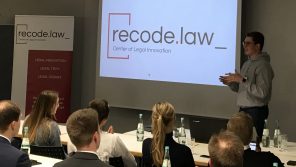Ulster University’s Legal Innovation Centre has launched a masters course which straddles both a Masters in Law (LLM) and a Masters of Science (MSc) to address the growing adoption of technology by law firms. The new programme is called “LLM/MSc Corporate Law, Computing and Innovation” and has been created in partnership with legal and tech leaders in Northern Ireland.
This novel course, based at the Belfast Campus, is designed as 50% computer science and 50% corporate, financial and tech law, with the Schools of Law and Computing, Engineering and Intelligent Systems collaborating under one umbrella, for the first time. This allows for the development of a multidisciplinary graduate: a tech-savvy lawyer or a computer science graduate who has a unique appreciation of legal and financial services.
Multi-national corporate partners have offered support to the new programme, including: Citi, Allen & Overy, Baker McKenzie, Herbert Smith Freehills, A&L Goodbody, Pinsent Masons, Factor Law, Allstate, iManage RAVN, Thomson Reuters, HNH, Davidson McDonnell, Grant Thornton, KPMG, Deloitte, EY and PWC.
Stephen Bartlett, EMEA Regional General Counsel & Global Co-Head Markets and Securities Services Legal, Citi, said:
“The delivery of legal services is evolving quickly, and depends increasingly on the overlapping disciplines of data science. Ulster University’s new ‘Corporate Law, Computing and Innovation’ course is an exciting opportunity to acquire the practical knowledge and skills that are much in demand, as legal practices of all types equip themselves with the resources they need to support markets, commerce and society in the new data-centric era.”
Modules include corporate law, derivatives and financial markets, technology and internet law, professional software development, data science and business intelligence. Graduates also receive instruction from experienced lawyers across corporate law, finance and derivatives, intellectual property, technology and internet law, artificial intelligence and machine learning.
Full time or part time, graduates can choose to exit the course with an MSc, LLM, Diploma or Postgraduate Certificate or some of those already in a profession may choose to join to upskill in a specific module.
Jane Hollway, Director of the Ulster University Legal Innovation Centre, said:
“Unquestionably the application of AI-based disruptive technology is transforming legal services delivery. Lawyers are operating in this dramatically changed landscape and with that comes the demand for the multidisciplinary lawyer. Firms are seeking lawyers and professionals with computing skills or computing technologists with corporate skills – the ‘unicorn’ graduate. Aligned with this, tech graduates with an understanding of corporate and financial landscape are highly sought after. The input of our international leaders in industry makes the course highly practical and our graduates, highly employable and future-proofed in terms of their skillset.”
Angela Clist, Partner, Head of Legal Services Centre, Belfast, Allen & Overy LLP, added:
“Allen & Overy is a significant employer of law graduates in Northern Ireland and is supportive of the new LLM/MSc law and technology masters programme. We are increasingly interested in employing graduates with multi-disciplinary skill-sets, particularly those with legal technology and computing backgrounds.”




